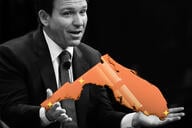You have /5 articles left.
Sign up for a free account or log in.
The presidents of nine leading research universities on Tuesday released a joint statement pledging continued work to promote the advancement of women in academic positions. The statement said that "barriers still exist" that prevent progress for female academics, and pledged to change institutional policies, provide resources and to "promote a culture that supports family commitments" as part of the drive to help women.
Among those signing the statement was Lawrence H. Summers of Harvard University, who started off the year defending comments -- for which he has since apologized -- saying that bias was no longer as much of a problem for women in science. Other presidents who signed the statement were the leaders of the California and Massachusetts Institutes of Technology; Princeton, Stanford and Yale Universities; and the Universities of California at Berkeley, Michigan and Pennsylvania.
The statement was released by Berkeley, which held a meeting in the summer to follow up on a meeting of the presidents of these nine institutions in 2001, in response to an earlier MIT report that faulted a variety of institutional policies in limiting the advancement of women. At the meeting this year, representatives of each of the universities gathered to share ideas on how to continue to help women in academe. The joint statement was released to encourage and draw attention to those efforts.
Because the discussion has its roots in an MIT report, and the comments by Summers created such an uproar this year, much of the public debate has concerned female faculty members in the sciences. But the joint statement said that the concerns extended beyond science, to women in "academic fields throughout higher education."
There were few details in the joint statement, beyond a mutual pledge to work on these issues. "While considerable progress has been made since 2001, we acknowledge that there are still significant steps to be taken toward making academic careers compatible with family caregiving responsibilities," the presidents said.
"The future excellence of our institutions depends on our ability to provide equitable and productive career paths for all faculty," they concluded.




